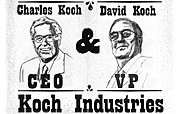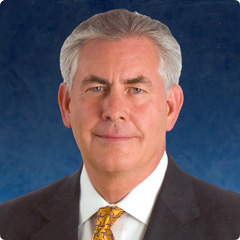 Greenpeace has been digging. It has unearthed Koch Industries as a major funder of climate change denial groups. A new 44 page report tells the story. It fits well with their more widely-scoped report Dealing in Doubt to which Gareth drew attention recently.
Greenpeace has been digging. It has unearthed Koch Industries as a major funder of climate change denial groups. A new 44 page report tells the story. It fits well with their more widely-scoped report Dealing in Doubt to which Gareth drew attention recently.
I was unaware of Koch Industries and, according to Greenpeace, that’s also the case for most Americans.
“This private, out-of-sight corporation is now a partner to ExxonMobil, the American Petroleum Institute and other donors that support organizations and front-groups opposing progressive clean energy and climate policy. In fact, Koch has out-spent ExxonMobil in funding these groups in recent years. From 2005 to 2008, ExxonMobil spent $8.9 million while the Koch Industries controlled foundations contributed $24.9 million in funding to organizations of the ‘climate denial machine’.”
The corporation is owned by the Koch brothers, two of the ten richest people in the US. Kansas-based Koch Industries is a conglomerate dominated by petroleum and chemical industries. The report details the roughly 40 climate denial and opposition groups receiving Koch foundation grants in recent years and notes this may be only part of the picture, since direct contributions from Koch family members, executives, or the company itself are not disclosed. Political influence is wielded in other ways as well, including $37.9 million from 2006 to 2009 for direct lobbying on oil and energy issues.
Greenpeace notes that around twenty of the groups Koch Industry supports were involved in the “ClimateGate” story of the supposed malfeasance of the climate scientists involved in the stolen UEA emails. Between them they set up the echo chamber which repeated and rebroadcast the story, claiming the emails prove a “conspiracy” of scientists and cast doubt on the scientific consensus regarding climate change.
It’s familiar enough ground. What’s new is the major part Koch Industries has played and continues to play in it. The Greenpeace report is further confirmation that climate change denial is firmly grounded in the vested interests of those whose wealth might be threatened by a move away from fossil fuels. Some of the denial campaign’s foot soldiers may consider that they have genuine intellectual reasons for their denial, but it’s hard to believe that the Koch brothers support is anything other than cynical.
For a short and engaging coverage of the issues involved it’s well worth having a look at this 8-minute video clip on DeSmog Blog. It’s from the Rachel Maddow show and includes an interview with Jim Hoggan the author of Climate Cover Up. He extends the period covered by the Greenpeace report and says that over 13 years Koch Industries have spent more than $50 million dollars supporting the 40 organisations. Hoggan’s field is public relations. He comments that the concerted attacks from apparently diverse sources poison public conversation and undermine public confidence in the science.
“The trick in public relations is always repetition…When you pour $50 million into the 40 organisations like this – and Koch Industries isn’t the only funder, Exxon and a number of other groups and companies are funding these 40 climate change denier outfits – that is an incredibly powerful influence over public opinion.”
Journalists still talk solemnly about the “damaged credibility” of climate science in the wake of Climategate. Big money so far has every reason to be satisfied with the return on their investment in the campaign of denial. Much less expensive than doing science and still apparently more effective. Hopefully there will be an end to it. James Hansen commented in a recent communication to his email list: “On the long run, these distortions of the truth will not work and the public will realize that they have been bamboozled.” But he feels obliged to add: “Unfortunately, the delay in public understanding of the situation, in combination with the way the climate system works (inertia, tipping points) could be very detrimental for our children and grandchildren.”
I often wonder whether these powerful vested interests give thought to the welfare of their children and grandchildren, who will share the common fate in a matter as fundamental as climate change.
Like this:
Like Loading...
 “It has become a rogue industry, reckless like no other force on Earth. It is Public Enemy Number One to the survival of our planetary civilization.” These are the words Bill McKibben uses to describe the fossil-fuel industry in a recent striking article in Rolling Stone which has received wide attention. It’s well worth reading, not least for the elegant lucidity of its prose. This post is not intended as some kind of summary, but rather as a reflection on McKibben’s notion that we need to recognise that we are up against a formidable enemy. He moves to this declaration by considering three numbers.
“It has become a rogue industry, reckless like no other force on Earth. It is Public Enemy Number One to the survival of our planetary civilization.” These are the words Bill McKibben uses to describe the fossil-fuel industry in a recent striking article in Rolling Stone which has received wide attention. It’s well worth reading, not least for the elegant lucidity of its prose. This post is not intended as some kind of summary, but rather as a reflection on McKibben’s notion that we need to recognise that we are up against a formidable enemy. He moves to this declaration by considering three numbers.
 I sometimes wonder what the CEOs of fossil fuel companies think about the effect of their products on the atmosphere and whether they harbour any anxieties about climate change. One of them, Rex Tillerson of ExxonMobil, has told us how he views the matter in his reply to a question
I sometimes wonder what the CEOs of fossil fuel companies think about the effect of their products on the atmosphere and whether they harbour any anxieties about climate change. One of them, Rex Tillerson of ExxonMobil, has told us how he views the matter in his reply to a question  Greenpeace has been digging. It has unearthed Koch Industries as a major funder of climate change denial groups. A new 44 page
Greenpeace has been digging. It has unearthed Koch Industries as a major funder of climate change denial groups. A new 44 page